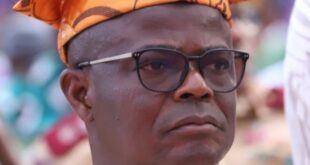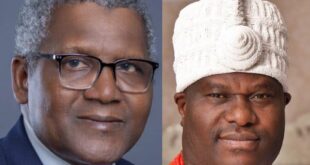Opinion:
BY ABIODUN KOMOLAFE
There has been another addition to President Bola Tinubu’s media team. The president has also restructured his media team in a bid to “enhance efficiency within the government’s communication machinery.” Thanks be to God!
Well, we are not here to look into the costs and benefits of this new addition at a time when Nigerians are clamouring for a review of the cost of the machinery of the government and the implementation of the Oronsaye Report on the cost of governance. Our focus is on the strategic relationship between government and citizens, as explored in ‘Media, democracy and the public interest’.
Politics, as Italian philosopher Antonio Gramsci noted, involves shifting the territory of discourse to advance one’s project. In a democratic setup, the government employs this principle – shifting the territory of discourse – to present its stance and persuade the public. Therefore, it is our considered opinion that, in a very difficult economic dysfunction, Tinubu should have emulated the British Prime Minister James Harold Wilson, who on getting elected in a very difficult economic crisis in 1964, chose as his Chief Media Spokesman, not a traditional media spokesperson but a young Economics professor to carry the public along as brutal decisions had to be made to navigate the crisis. It was a game-changing appointment! The Tinubu-led government should still consider this!
That said, the government’s response to the economic crisis, caused by decades of policy mishaps and ill-advised decisions, is necessary and inevitable. However, while this response brings short-term pain, it also sparks disaffection among citizens. To address this, a democracy facing economic turmoil needs constant, clear explanation of the situation and the importance of reforms. These “explainers” should emphasize how reforms benefit the majority of working individuals and their families. The government must now concentrate on the team of explainers, as consistent and clear messaging is crucial for building public trust and understanding.
The Tinubu government must now determine the territory of the debate rather than adopting a perceived reactive position. This is what governments in very difficult economic circumstances have always done and indeed are expected to do. New forms of messaging must be explored in a creative and imaginative pursuit of wooing the audience and in the process capturing and moulding hearts and minds.
As the Canadian communication theorist Marshall McLuhan notably argued, “The medium is the message.” The government must determine a cost-effective medium to use for its messaging explainers and constant reminders. A review of strategy, methods and effectiveness must be carried out. This is very important for a country at a critical juncture like ours. Resorting to insults and profanity may bring momentary comfort, but it accomplishes nothing meaningful and can have devastating repercussions.
Daron Acemoglu, Turkish-American economist and 2024 Nobel Memorial Prize in Economics winner noted in ‘Why Nations Fail’, that nations must navigate critical junctures. Nigeria at a pivotal moment presents the Tinubu government with a historic opportunity to redefine the country’s political economy and be interpreted as the game-changing administration. To achieve this, the government must engage the majority and build a lasting national consensus. This requires revitalizing messaging and the positive redirection of the territory of the debate to support its visionary project.
The relationship between democracy and the press is a sacred one. As the fourth estate, the press promotes democratic values like freedom, equality and justice. Ideally, it acts as a catalyst for change, barking loudly when those in power overstep their boundaries. However, when the press becomes beholden to special interests or political ideologies, it can create an echo chamber amplifying misinformation and drowning out dissenting voices. When the delicate dance turns into a tug-of-war between the pursuit of truth and the pursuit of profit, the tension can lead to a watered-down version of the truth, where sensationalism reigns supreme and fact-checking takes a backseat.
It also needs to be noted that the power of the press is a double-edged sword – it can either uphold or undermine democracy, depending on how it is wielded. When the press is free to report the truth without fear or favour, democracy flourishes. But when the press is compromised or manipulated, democracy suffers. It’s a simple equation, but one that requires constant vigilance to maintain. As citizens, it’s our responsibility to ensure that the press remains a force for good, holding those in power accountable and providing us with the truth, no matter how uncomfortable it may be.
Presently, the Nigerian media landscape is a complex web of economic struggles, government influence and the quest for survival. Unfortunately, the media has been browbeaten into submission, forced to prioritize government patronage over objective reporting. Media owners and practitioners are caught between a rock and a hard place, desperate to stay afloat amidst economic crisis. The allure of government adverts and sponsorships is too great to resist, even if it means injuring journalistic integrity.
In this precarious environment, social media has emerged as a beacon of hope, offering a cheaper and relatively punishment-free alternative. However, traditional media outlets remain terrified of losing government patronage, which could spell financial disaster. The example of Lagos-Abeokuta Road, a death trap that’s been ignored by mainstream media, highlights the consequences of this fear. TVC, for instance, cannot afford to lose the one-hour program sponsored by the Ogun State Government. This predicament raises fundamental questions about the role of media in a democratic society. Take, for instance, how can journalists maintain objectivity when their livelihoods depend on government favour? The economic crisis has only exacerbated this issue, as companies slash advertising budgets and media outlets scramble for scraps.
The situation is dire, with industrial firms pulling out and leaving Nigeria’s media landscape impoverished. Media outlets struggle to stay afloat, compromising their independence, patronage and sponsorship come with strings attached, stifling objective reporting, and the public views media content with skepticism, eroding trust in institutions. How then can the media reclaim its role as a watchdog, holding those in power accountable and fostering a more informed, engaged citizenry?
In an address to the All Nigerian Editors Conference, recently, the president highlighted the pivotal role of the media in Nigeria’s democracy. He acknowledged that the country’s democratic experience wouldn’t have been possible without the media’s tireless efforts. He therefore urged media practitioners to continue holding elected officials accountable, promoting transparency and mutual respect.
Obviously, Tinubu’s emphasis on cooperation between the government and media is a step in the right direction. By recognizing their intertwined roles, both parties can work together to empower citizens, strengthen democratic institutions and foster a more informed society. As experts have noted, Nigeria’s democratic progress hinges on the media’s ability to hold leaders accountable and promote transparency. In other words, if the president’s ‘Renewed Hope Agenda’ must work in a way to unlock Nigeria’s vast potential, it’s crucial that press freedom and accountability remain the cornerstones of this vision.
Harold Wilson’s ability to simplify complex issues was pure genius. Despite not being a journalist, he could explain intricate concepts in an accessible way, making him understandable to everyone, including a market vendor. Nigerian states and local governments can learn from Wilson’s approach. Currently, they struggle to articulate their stance on the minimum wage debate. Emulating the Federal Government’s communication strategy would help clarify their positions and foster better public understanding.
May the Lamb of God, who takes away the sin of the world, grant us peace in Nigeria!
*Abiodun Komolafe writes in from Ijebu-Jesa, Osun State, Nigeria (ijebujesa@yahoo.co.uk)
 Startrend International Magazine For Your Latest News And Entertainment Gists
Startrend International Magazine For Your Latest News And Entertainment Gists





